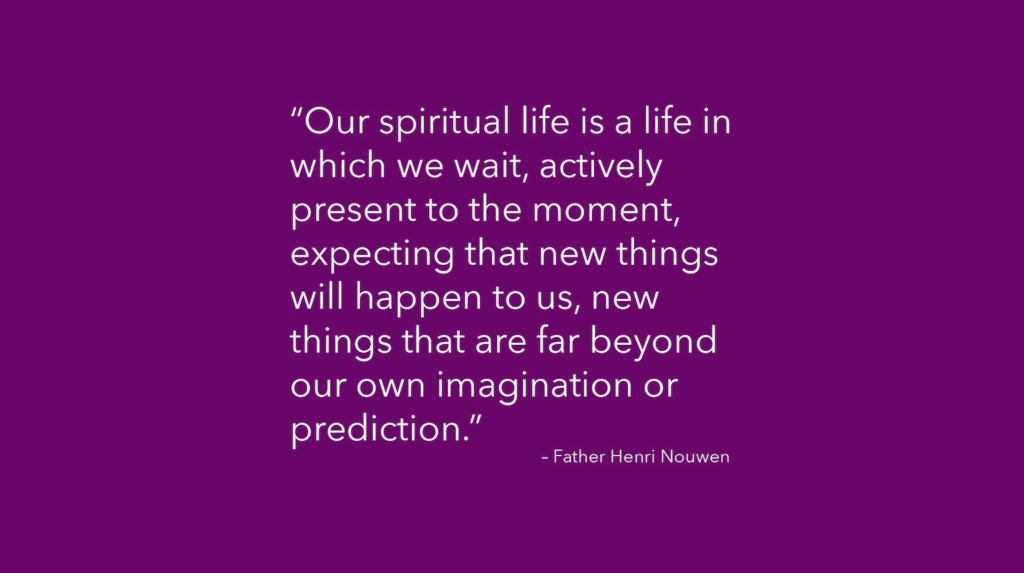What are you waiting for this Christmas? We have spent so much time in the last two years waiting. Waiting fearfully to see if we or a family member will get sick. Waiting for a vaccine shot or a test result.
Waiting to visit family after months or years apart. Waiting to celebrate a wedding. Waiting to gather for a funeral. Waiting to find an open hospital bed. Waiting to get back to “normal.”
Waiting can be painful, especially when it feels forced upon us due to COVID-19.
The spiritual writer Father Henri Nouwen speaks into this pandemic moment, pointing out that “increasingly in our society, we feel we have less and less influence on the decisions that affect our own existence. Therefore, it becomes increasingly important to recognize that the largest part of our existence involves waiting in the sense of being acted upon. The life of Jesus tells us that not being in control is part of the human condition. His vocation and ours are fulfilled not just in action, but also in passion, waiting.”
Father Nouwen observes that the spiritual practice of patient waiting is a prerequisite to recognizing and receiving God’s presence.
In the beginning of the Gospel of Luke, God reveals his great plan of salvation, not with a big bang or parade, but in the quiet, patient waiting of two vulnerable women.
The first characters that Luke introduces us to are an old man and woman who were unable to conceive. Elizabeth and Zechariah waited decades for a child, month after month, year after year, disappointment after disappointment. Yet they waited with patient expectation.
Luke tells us that the angel Gabriel appeared to Zechariah to announce the news that his wife would finally bear a child “when he was serving as priest … before God” (Lk 1:8) in the Temple. Cultivating a spirituality of waiting, like Zechariah, begins by spiritually showing up, no matter how imperfect our prayer or trust in God.
Elizabeth, too, is spiritually active. She avoids the noise, distraction and attention that such a miraculous pregnancy announcement might have drawn, choosing instead to seclude herself for five months (Lk 1:24), spending time in silence and prayerful gratitude.
A spirituality of waiting is not passive; it is active spiritual work to become more attentive to the quiet voice of God.
In what must have been a surprise to his gentile readers, the next character Luke introduces is an unassuming teenage girl, a young Mary, engaged and preparing to marry her love, Joseph. Unlike Elizabeth, she was not waiting to conceive when Gabriel appeared to her announcing her unplanned pregnancy.
Yet Mary’s fiat (“may it be done to me according to your word”) in the face of shame and difficulty reveals her radical vulnerability and openness to God. She did not hope in herself or her own predetermined plans and dreams, but trusted in God’s plan that was beyond her vision.
Mary teaches us that a spirituality of waiting is hopeful, daring to see beyond our own imagination.
Her complete trust and hope in God stand in contrast with the more controlling (and relatable) response of Zechariah, who initially doubts the angel Gabriel with an unimaginative pragmatism: “I am an old man and my wife is advanced in years” (Lk 1:18).
Many of us are like Zechariah, striving to be faithful to God but unwilling to be vulnerable enough to suffer hope.
Mary’s witness in the Gospels reminds us that living with patient hope requires embracing suffering.
Father Nouwen notes that “patience comes from the word ‘patior,’ which means ‘to suffer.’ The first thing that Jesus promises is suffering. … But he calls these birth pains. And so, what seems a hindrance becomes a way; what seems an obstacle becomes a door; what seems a misfit becomes a cornerstone. … To wait patiently, therefore, means to allow our weeping and wailing to become the purifying preparation by which we are made ready to receive the joy that is promised to us.”
This Advent, in the midst of suffering in our daily lives, the distractions of Christmas preparations or the mourning of loved ones not gathered around our table, we are called to be people of hope, “living with the conviction that God molds us in love, holds us in tenderness and moves us away from the sources of our fear. Our spiritual life is a life in which we wait, actively present to the moment, expecting that new things will happen to us, new things that are far beyond our own imagination or prediction.”
When we lack the imagination of Christian hope, we can return to the witness of Elizabeth and Mary, remembering that with “God all things are possible” (Mt 19:26).
We can also take solace in the fact that spiritual waiting does not mean waiting alone. We wait with Mary, pregnant with hope.
We wait with Mary, adoring the child Jesus who is always patiently waiting for us in prayer.
We wait with Mary at the foot of the cross where Jesus suffers to save us, not quickly, but patiently. A patience he learned from his mother.
Jonathan Lewis is vice president of customer operations at Catholic Faith Technologies and lives in Washington with his wife and two children.

